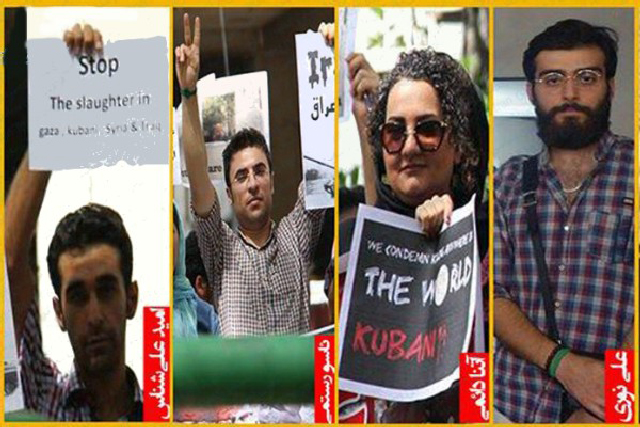 Iranhumanrights.org – Cases Expose Judiciary’s Lack of Independence
Iranhumanrights.org – Cases Expose Judiciary’s Lack of Independence
In another example of the Iranian Judiciary’s lack of independence, an Appeals Court has upheld disproportionate prison sentences against four civil rights activists following pressure by the Revolutionary Guards, the activists told the International Campaign for Human Rights in Iran.
Fatemeh (Atena) Daemi and Omid Alishenas have each been sentenced to seven years in prison while Aso Rostami and Ali Nouri have each been sentenced to two years in prison.
“Our case was not judged fairly by any means,” Daemi said in an interview with the Campaign on September 29. “In fact, it was the Revolutionary Guards agents who were mostly in charge of prosecuting us. My lawyer and I were not given a chance to present a defense during the preliminary trial and we saw a letter from the Revolutionary Guards addressed to the Appeals Court asking for the maximum punishment against us.”
Also speaking to the Campaign, Alishenas said: “When my mother asked the judge why he had issued such a harsh sentence, he said ‘we are under pressure from the Revolutionary Guards’.”
“The sentences were handed down under the influence of security forces,” Rostami told the Campaign. “We did not see any signs of a fair trial in any of our court sessions. The first trial lasted barely 10 minutes. The lawyers were not allowed to have a copy of the indictments and they weren’t given a chance to present a defense.”
According to the ruling by Branch 36 of the Tehran Appeals Court delivered to Daemi’s lawyer on September 29, 2016, guilty verdicts were upheld against the four activists for “assembly and collusion against national security” and “insulting the supreme leader.”
Based on Article 134 of Iran’s New Islamic Penal Code, the activists would become eligible for release after serving the prison term for the heaviest punishment (five years for Daemi and Alishenas, and a year and a half for Rostami and Nouri).
The four are currently free on bail.
“These judges all have one thing in common: hatred for good, humanitarian young people,” wroteAlishenas’s mother, Simin Eyvazzadeh, on her Facebook page. “If they were thieves and had stolen billions, would they have gotten the same punishment? I should have wished my son were a thief to be shown mercy. No, I would never wish such a thing. I have a lot to say when the time is right.”
Alishenas, Daemi, Rostami and Nouri were arrested in August and September 2014 by the Revolutionary Guards’ Intelligence Organization for their peaceful protest activities including engaging in campaigns against the death penalty, condemning the mass executions of political prisoners in the 1980s, meeting the families of political prisoners, and criticizing official corruption.
Their joint preliminary trial, which lasted less than half an hour, was held on March 5, 2015 at Branch 28 of the Revolutionary Court presided by Judge Mohammad Moghisseh. Daemi was initially sentenced to 14 years in prison, Alishenas to 10 years in prison, and Rostami and Nouri were each sentenced to seven years.
 Shabtabnews In this dark night, I have lost my way – Arise from a corner, oh you the star of guidance.
Shabtabnews In this dark night, I have lost my way – Arise from a corner, oh you the star of guidance.


